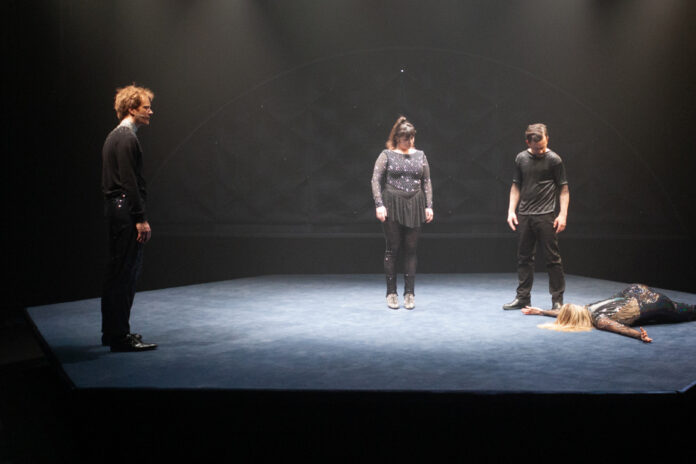Unbearable long embraces is the fourth play by Russian Ivan Viripaev presented at Prospero, but the first staged by Philippe Cyr as artistic director of the theater on Ontario Street. Mission accomplished !
Ivan Viripaev now lives in Poland. His texts are now banned in Russia since he asked the authorities of Putin’s country to pay his royalties to an Aid Fund for Ukraine. Irreverence, you say?
His creations feed on it, sometimes bordering on cynicism. In Unbearable long embraces, between New York and Berlin, four characters in their thirties collide: the Polish Monica, the New Yorker Charlie, the Serbian Amy and the Czech Christophe.
They and they eat vegan and drink a lot, share a quest for the absolute between God and the cosmos, and fuck who better. With Viripaev, however, the subject of the play is never to be found in raw sexual vocabulary or even in the abuse of illicit substances, but in the revelations, including that of a certain spirituality, that their deleterious actions paradoxically allow to bring out.
It is only by withdrawing into themselves and rediscovering an original impulse that they and they will end up touching, on the verge of death, a desirable peace, or at least, as expressed in unison, tenderness. .
Armed with sequined clothes like starlets from musicals, the protagonists stroll on a revolving stage and in front of a huge padded stage backdrop that is reminiscent of a headboard, but which could also refer to the security walls of a madhouse.
Monica, Amy, Charlie and Christophe sometimes look like it. The voices, which they hear in their brain or which could come from another galaxy, then pull the story towards the fantastic. This strange climate is highlighted in particular by the light beams of Cédric Delorme-Bouchard.
The director Philippe Cyr gives here a lesson in contemporary theatre. The playing is most often distanced (Brecht), but at rare moments very felt (Stanislavski), then even more impressive, sometimes with great physical expressiveness (Grotowski) and an almost cruel overall requirement (Artaud) .
Among other things, when they play two characters at the same time and, during the final scenes, using contortions to evoke long embraces.
The show makes you laugh and smile. The staging cleverly maintains a balance between a certain laughable glamour, deep existential questioning and downright surprising descriptive lines. So much so that the public often finds themselves seated between two chairs, also led to blend into the new-age impulses of the story.
A false ending, a small downside, precedes the real one, repeating a few lines that are futile in our opinion. Let’s admit at the same time that the strategy of Viripaev’s plays remains to handle the very serious remarks launched with false carelessness.
Here too, he seems to be telling us, in tune with the artisans of this excellent show, that nothing should be taken seriously, suggesting, with a smirk, to have a little thought for life in the afterlife. We never know.















